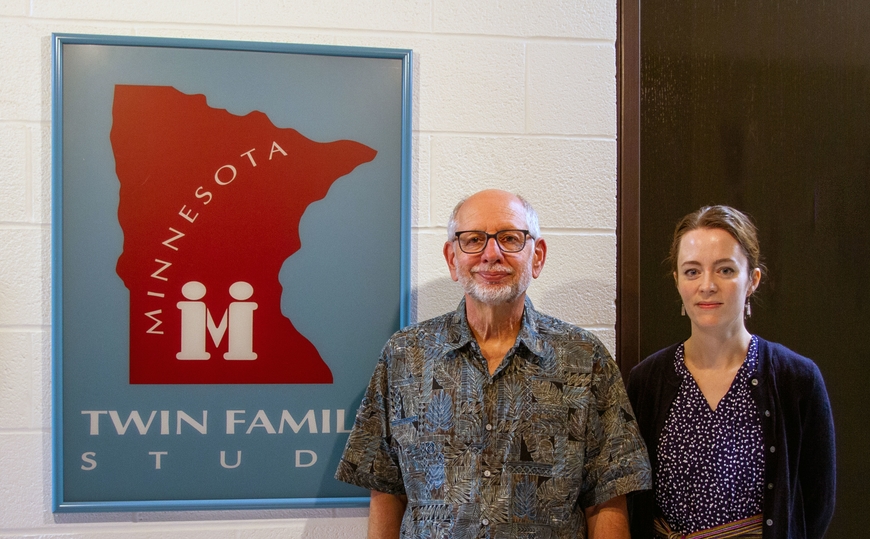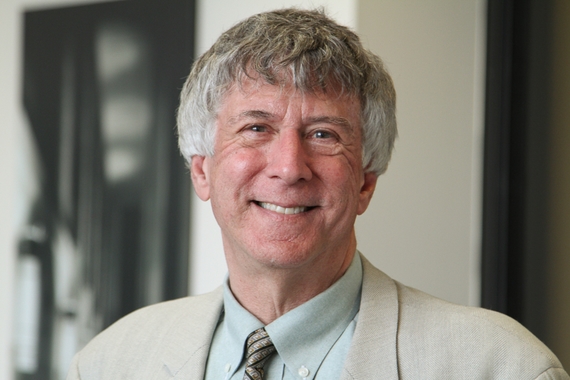Recognizing Kevin Haroian, Retiring Director of Minnesota Center for Twin and Family Research
This fall we are celebrating the retirement of Kevin Haroian and remembering his four decades of service to the University of Minnesota as the Director of the Minnesota Center for Twin and Family Research (MCTFR). Above is Kevin standing with Rachel Hawley, the new Director of the MCTFR. Below is a history of Kevin's time at the University as well as a history of the MCTFR, as these narratives are inextricably bound.
In 1987 Professors David Lykken, Matt McGue, and William Iacono secured a grant from the National Institute of Drug Abuse (NIDA) to institute a longitudinal study of adolescent twins. Professor Lykken had put Minnesota on the map for doing twin research with the establishment of the Minnesota Twin Registry a few years prior. The NIDA grant was large and expectations were high; yet, the first few years of the study proved to be administratively difficult. The lead investigators and a young man named Kevin Haroian began meeting at the Campus Club every week, hammering out procedures that continue to make them successful today. By 1990 the newly named Minnesota Twin Family Study (MTFS) had moved to its current home in the Department of Psychology, adopted new administrative methods, and hired Kevin Haroian as their first director. The MTFS went from assessing 50 twins and their families per year to assessing 180 twins and their families per year.
Over the years the study expanded. Soon after that initial increase in research productivity, President George H. Bush required that all National Institute of Health (NIH) grants include women as well as men. The MTFS added a large all-female twin study to their previously all-male study, essentially doubling the number of research participants the study was managing and thereby doubling the work. Soon, the study obtained a grant to include adoptees in their research studies and expanded even more. The MTFS evolved into its current formation, the Minnesota Center for Twin and Family Research (MCTFR), in 1993.
Matt McGue, one of the lead investigators of the MCTFR, described Kevin's role in the growth and management of the MCTFR this way:
The scope of the MCTFR is unprecedented, at least among psychology departments. Kevin has overseen a database with over 190 million individual data points, managed a staff that has administered more than 34,000 individual assessments, and supported research that has resulted in more than 400 scientific publications and 19 Ph.D. theses. The MCTFR during his tenure has also served nearly 9000 pizza lunches to research participants, distributed nearly four million dollars in participant honoraria, and has contacted research participants by telephone some 85,000 times (and oh, by the way, Kevin built the applications that keep track of all these statistics.)
People who have worked with Kevin know him as a mentor, someone who set high expectations and taught others why well-run, well-maintained labs and strong study administration were essential for producing good science. Kevin did not shy away from strong disagreements, especially when he felt that a matter of policy was in question. Kevin shepherded hundreds of graduate and undergraduate students, as well as research faculty and staff, through the mountains of details that make up running a major research laboratory. Former employees of Kevin, Professor Scott Carlson, U of M Duluth, and Professor Henry Yoon, Augsburg University, said in a recent letter: "Kevin made compliance a given … while also quietly providing the due diligence necessary to ensure that policy was followed and not assumed."
And it was the people, the mentoring that Kevin has appreciated most from his time at the MCTFR. "It is great to work with people you respect and who work very hard. Commitment to this project has been great." During his tenure, Kevin hired over 700 people and worked with hundreds more. He liked watching students, staff, and young researchers develop and succeed. The ethos of the MCTFR is to take on challenges and set high expectations. Kevin helped develop and foster this ethos at the MCTFR and pass it on to other scientists working throughout the United States and internationally.
Professors Carlson and Yoon added that all of this was fine but only if good science was achieved. In studying twins and their families, the MCTFR seeks to, "estimate how genes and environment interact to influence character, strengths, vulnerabilities, and values. " Kevin knows that the MCTFR has helped science make progress in understanding that mental health pathologies almost always have a genetic component, which is shaped, reformed, and amplified through gene-environment interaction. Disappointments remain, especially in helping to better understand mental illness. Kevin is hopeful about the future and notes that the whole field is increasingly focusing on molecular genetics, an approach one of the new lead investigators, Associate Professor Scott Vrieze, is now spearheading in the MCTFR.
Kevin and the excellent researchers of the MCTFR have achieved over $108 million in grant awards since that first NIDA grant. In thinking about his work and that of the University at large, Kevin channeled Professor Paul Meehl and reminded us that the public has helped fund scientific endeavors for decades because the public has questions which they expect science to answer. Kevin has held fast to his high standards and principles over the years specifically because those public expectations are high and the questions about mental health and mental illness require scientific answers.
On the eve of his retirement, Kevin reflected, "It's been a great ride. It's been a great place to work, the University. Got no regrets."



